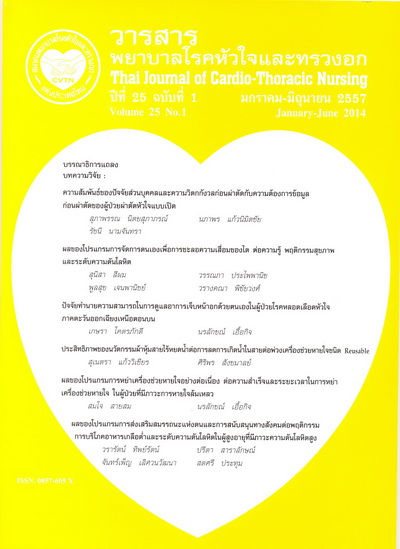ผลของโปรแกรมการส่งเสริมสมรรถนะแห่งตนและการสนับสนุนทางสังคมต่อพฤติกรรมการบริโภคอาหารเกลือต่ำและระดับความดันโลหิตในผู้สูงอายุที่มีภาวะความดันโลหิตสูง
Keywords:
โปรแกรมการส่งเสริมสมรรถนะแห่งตน, การสนับสนุนทางสังคม, พฤติกรรมการบริโภคอาหารเกลือต่ำ, ผู้สูงอายุที่มีภาวะความดันโลหิตสูง, The self-efficacy, social support program, Low-salt dietary, behavior, Elderly patients with hypertensionAbstract
การวิจัยครั้งนี้เป็นการวิจัยแบบกึ่งทดลองมีวัตถุประสงค์เพื่อศึกษาผลของโปรแกรมการส่งเสริมสมรรถนะแห่งตนและการสนับสนุนทางสังคม ต่อพฤติกรรมการบริโภคอาหารเกลือต่ำและระดับความดันโลหิตของผู้สูงอายุที่มีภาวะความดันโลหิตสูง ตามแนวคิดการรับรู้สมรรถนะแห่งตนของ Bandura (1997) และการสนับสนุนทางสังคมของ House (1981) กลุ่มตัวอย่าง คือ ผู้สูงอายุที่มีภาวะความดันโลหิตสูง ที่มารับบริการ ณ คลินิกชุมชน อำเภอเมือง จังหวัดตรัง จำนวน 50 คน แบ่งเป็นกลุ่มทดลอง 25 คน และกลุ่มควบคุม 25 คน โดยจับคู่ด้าน ข้อมูลส่วนบุคคล และผู้ดูแลจำนวน 50 คน แบ่งเป็นกลุ่มทดลองและกลุ่มควบคุมกลุ่มละ 25 คน โดยจับคู่ด้านข้อมูลส่วนบุคคล กลุ่มทดลองได้รับโปรแกรมการส่งเสริมสมรรถนะแห่งตนและการสนับสนุนทางสังคม กลุ่มควบคุมได้รับการพยาบาลตามปกติ เก็บรวบรวมข้อมูลโดยใช้แบบสอบถามพฤติกรรมการบริโภคอาหารเกลือต่ำและติดตามระดับความดันโลหิต วิเคราะห์ข้อมูลโดยสถิติเชิงพรรณนา และสถิติการทดสอบค่าที
ผลการศึกษาพบว่า หลังได้รับโปรแกรมการส่งเสริมสมรรถนะแห่งตนและการสนับสนุนทางสังคมคะแนนเฉลี่ยพฤติกรรมการบริโภคอาหารเกลือต่ำ ความดันโลหิตซิสโตลิกและความดันโลหิตไดแอสโตลิกของผู้สูงอายุที่มีภาวะความดันโลหิตสูงดีกว่าก่อนได้รับโปรแกรมฯ อย่างมีนัยสำคัญทางสถิติ (p< .05) และคะแนนเฉลี่ยพฤติกรรมการบริโภคอาหารเกลือต่ำ ความดันโลหิตซิสโตลิกและความดันโลหิตไดแอสโตลิกของกลุ่มที่ได้รับโปรแกรมฯ หลังการทดลองทันทีดีกว่ากลุ่มที่ได้รับการพยาบาลตามปกติอย่างมีนัยสำคัญทางสถิติ (p< .05) และหลังสิ้นสุดการทดลองใน 4 สัปดาห์ ความดันโลหิตซิสโตลิกและความดันโลหิตไดแอสโตลิกของกลุ่มที่ได้รับโปรแกรมฯ ดีกว่ากลุ่มที่ได้รับการพยาบาลตามปกติอย่างมีนัยสำคัญทางสถิติ (p< .05)
ข้อเสนอแนะ : ควรมีการศึกษาเพิ่มเติมเกี่ยวกับการติดตามผลของโปรแกรมการส่งเสริมสมรรถนะแห่งตนและการสนับสนุนทางสังคมที่มีต่อพฤติกรรมการบริโภคอาหารเกลือต่ำในระยะยาวเป็นเวลา 6 เดือนขึ้นไป และควรประเมินความคงอยู่ของพฤติกรรมการบริโภคอาหารเกลือต่ำและระดับความดันโลหิตในผู้สูงอายุอย่างต่อเนื่อง
The Effect of the Self-Efficacy and Social Support Program Enhancing to Low-Salt Dietary Behavior and the Level of Blood Pressure in Elderly Patients with Hypertension
This quasi-experimental study was conducted to investigate the effect of the self-efficacy and social support program enhancing to low-salt dietary behavior and the level of blood pressure in elderly patients with hypertension based on the perceived self-efficacy (Bandura, 1997), and social support (House,1981).The samples were consisted of elderly patients with hypertension receiving the health services in the Community Clinic Muang district,Trang province. Totally 50 samples were matched paired with characteristics and divided into an experimental group of 25 cases and a control group of 25 cases. Totally 50 caregivers were matched paired with characteristics and divided into a experimental group of 25 cases and a control group of 25 cases. The experimental group received a self-efficacy and social support program. The control group received the conventional nursing care. Data were collected using questionnaires regarding the low salt dietary behavior and monitoring blood pressure level. Data were analyzed using descriptive statistic and the t-test statistic.
The results showed that after receiving a self-efficacy and social support program, mean score of the low-salt dietary behavior, the systolic blood pressure and diastolic blood pressure in elderly patients with hypertension were better than before receiving the program with the statistically significant (p< .05). The mean score of the low-salt dietary behavior, the systolic blood pressure and diastolic blood pressure for those receiving the program were better immediately than those receiving the conventional nursing care after completed the trial with statistically significant (p< .05). In addition, the systolic blood pressure and diastolic blood pressure for those receiving the program were better than those who received the conventional nursing care with significantly statistical (p< .05) after the end of the experiment in 4 weeks.
It is recommended that further study should evaluate the effect of the self-efficacy and social support program enhancing to low-salt dietary behavior and the level of blood pressure in elderly patients with hypertension in long term more than six months. In addition, the elderly should be evaluated to maintain low-salt dietary behavior and the level of blood pressure continuously.
Downloads
Published
How to Cite
Issue
Section
License
บทความนี้ยังไม่เคยตีพิมพ์หรืออยู่ในระหว่างส่งไปตีพิมพ์ในวารสารอื่น ๆ มาก่อน และกองบรรณาธิการขอสงวนสิทธิ์ในการตรวจทาน และแก้ไขต้นฉบับตามเกณฑ์ของวารสาร ในกรณีที่เรื่องของท่านได้ได้รับการตีพิมพ์ในวารสารฉบับนี้ถือว่าเป็น ลิขสิทธิ์ของวารสารพยาบาลโรคหัวใจและทรวงอก






